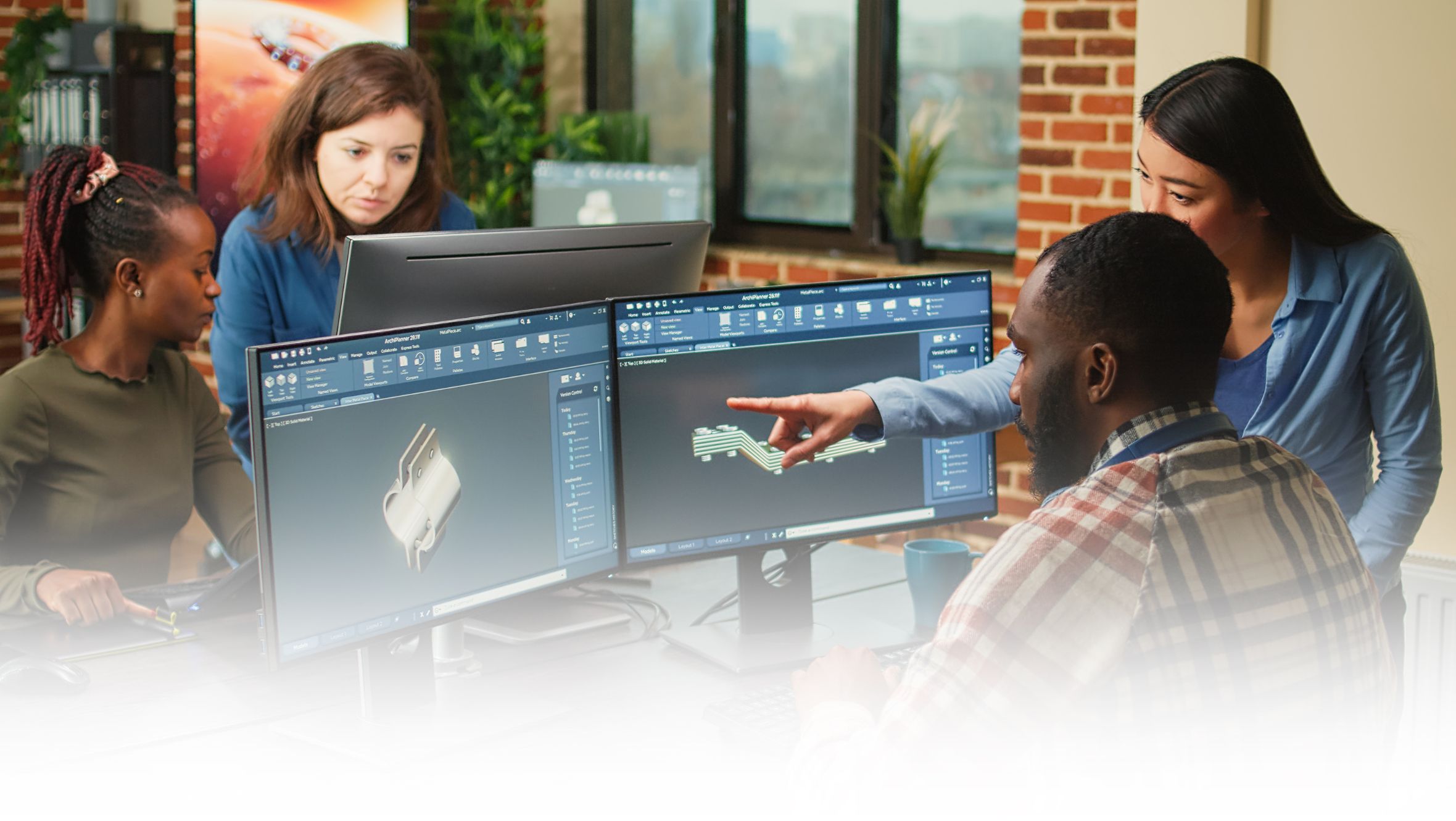6 Emerging Technologies in Engineering to Watch
Emerging technologies in engineering are essential to stay ahead of the curve and guarantee that service deliverables remain up-to-date and relevant.
Engineering
March 15, 2023
9 minutes read

“”
With the increasing availability of advanced tools and software, engineers can adapt and optimize their work to be more efficient and reduce possible errors.
Emerging technologies in engineering play a crucial role in defining the trajectory of the future. For engineering consulting services, it is important to adopt cutting edge tools and methodologies to stay ahead of the curve and to guarantee that the service deliverables stay up-to-date and relevant as the world continues to evolve.
Some of the most promising emerging technology trends have been talked about for a long-time, such as Artificial Intelligence and Virtual Reality. These tools are now at a stage of development in which they can be implemented in a multitude of ways, even in our day-to-day life, but other example of technology trends, are only now coming into the spotlight, like Digital Twins.
Key-takeaways
Emerging technologies in engineering are essential to stay ahead of the curve and guarantee that service deliverables remain up-to-date and relevant.
Artificial Intelligence (AI) can automate processes, reduce costs, and help with predictive maintenance and the design process.
The Internet of Things (IoT) can be used to monitor and control infrastructure, and optimize maintenance schedules in mechanical engineering services.
Virtual Reality (VR) and Augmented Reality (AR) can provide engineers with new tools to design complex projects and improve safety and accuracy on construction sites.
Digital twins are virtual representations of physical assets, processes, and systems that are created by collecting data from various sources. They provide engineers with unprecedented insights into the behavior of complex systems and allow them to identify and address issues before they occur.
Robotics can be used in a variety of tasks, such as inspecting infrastructure or performing complex construction tasks.
Biometrics can revolutionize the way we identify and authenticate individuals, especially in biomedical engineering.
Emerging technologies and Engineering Services
In engineering services, emerging technology is a term used to define up-and-coming technology trends, but it can also be used to refer to a technology that already exists, but that is in continuous development, and still is relevant to engineering services.
With the increasing availability of advanced tools and software, engineers can adapt and optimize their work to be more efficient and reduce possible errors. As society evolves, it is normal to have different interests and concerns, and engineering services are always at the forefront of this adaptions.
What are the emerging technologies in engineering in 2023?
Based on current trends and developments, some emerging technologies in engineering are expected to have a significant impact on engineering services and might possibly be changing the future of all engineering fields.
Artificial Intelligence (AI)
Artificial Intelligence has been known as one of the most exciting emerging technologies in engineering. AI has the potential to automate many of the processes that are currently performed manually. This allows engineering services to operate faster, more efficiently, and to be more cost-efficient.
AI is especially prevalent in predictive maintenance. Machine learning algorithms are udes to analyze data from sensors, and so engineers can identify issues before they become serious setbacks. This reduces downtime and maintenance costs.
Design process is another big way in which AI can be beneficial for structural engineering services. Engineers need to generate and test several design iterations to ensure they present their clients with the best solution for their project. AI allows them to do so quickly and efficiently.
Internet of Thing (IoT)
The Internet of Things is a network of interconnected devices that can communicate with each other and share data between one another. An example of IoT might be smart home or car appliances.
In engineering services, IoT devices are used to monitor and control infrastructure, for example. This provides engineers with real-time data on the performance of their projects.
In infrastructure engineering, the Internet of Things might be used to monitor the structural integrity of a bridge, for example. In this case, engineers would be alerted of any potential issues that might arise before they become serious problems. In mechanical engineering services, on the other hand, it might be used to monitor machine performance and equipment, in order to optimize maintenance schedules.
Virtual Reality and Augmented Reality (VR and AR)
Another emerging technology trend for engineering consulting is virtual and augmented reality, which provide engineers with new tools to design complex projects and give them a chance to visualize them.
VR can be used to create immersive 3D environment, allowing engineers to not only explore, but to interact with virtual models of their projects before building them. By using VR during the creation process, engineers can eliminate potential problems before they even come to life.
Augmented reality (AR) differs from virtual reality (VR), because instead of creating a 3D environment, it overlays digital information onto the real world, providing engineers with real-time data and feedback on their projects.
AR and VR can be crucial in construction sites, as they improve safety and accuracy, aside from allowing engineers valuable insights to their designs.
Digital Twins
Digital twins are virtual representations of physical assets, processes, and systems. They are created by collecting and inserting data from various sources, such as sensors, and using this data to create a real-time digital replica of the physical product.
From optimizing design and performance of physical assets to improving maintenance and management of potential issues, digital twins are revolutionizing the engineering industry by providing engineers with unprecedented insights into the behavior of complex systems, allowing them to identify and address issues before they occur, as well as support ongoing maintenance efforts by providing real-time data, analytics and solutions.
Digital twins can be used in several engineering fields across the board, like aerospace engineering, energy engineering, and on. For example, automotive engineers in Formula 1 are already using digital twins to analyze data as the race or practice goes on, and, allying digital twins with 3D printing technology, they are able to print new parts to improve performance quickly and efficiently.
Robotics
Robotics is another emerging technology in engineering that is set to transform these services.
Robotic systems, just like AI, have been in the picture for a long time. In aerospace engineering, for example, robotics has been a defining tool for evolution. However, only now are they reliable enough to be used to do a variety of tasks, such as expecting infrastructure or performing complex construction tasks.
The area of inspection and maintenance is one in which the application of robotics seems to be very promising. Robotic systems can be used to inspect difficult to-reach areas, pipelines and offshore platforms, for example, reducing the need for human workers to perform dangerous tasks.
Biometrics
Biometrics continues to revolutionize the way we identify and authenticate individuals, by providing a more accurate and secure method than traditional authentications methods. However, it is not as an authentication system that biometrics stand out as an emerging technology in engineering, as this fingertip or facial feature authentication is now a staple in our day-to-day device usage.
In biomedical engineering, biometrics is being used to monitor patients, as well as improve the accuracy and efficiency of medical diagnoses and treatments.
In automotive engineering, biometrics is used to increase the safety and convenience of driving, by identifying drivers and adjusting vehicle preferences to their liking.
For aerospace engineering, biometrics is used to monitor the health of astronauts in space. However, it is also used for safety control in airports.
Finally, in robotics engineering, biometrics can be used to enable robots to recognize and interact with humans, as well as to enhance their security and safety features.
How do emerging technologies in engineering affect engineering consulting services?
Emerging engineering technologies are having a significant impact on engineering consulting, changing the way that consulting services are delivered and the type of expertise that is required.
Emerging technologies are affecting engineering consulting by improving collaboration and communication. For example, cloud-based project management software and virtual collaboration tools allow engineers to work together on projects from different locations, improving efficiency and reducing costs. Additionally, emerging technologies such as augmented reality and virtual reality are enabling new possibilities for visualizing and communicating complex designs to clients and stakeholders.
Overall, emerging technologies in engineering are creating new opportunities and challenges for engineering consulting, requiring consultants to adapt to new tools, processes, and ways of working to stay competitive and provide the highest quality services to clients.







